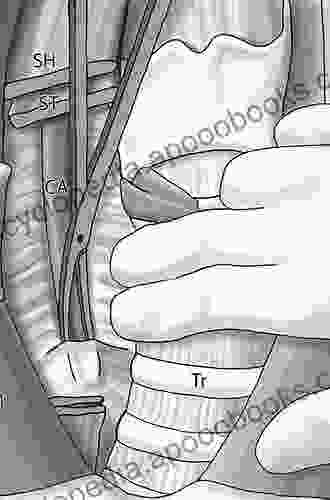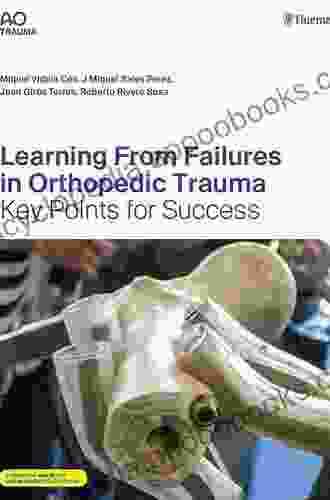Learning From Failures In Orthopedic Trauma: A Path to Excellence

In the demanding field of orthopedic trauma surgery, the stakes are high and the potential for failure is ever-present. While failure can be a disheartening experience, it also holds invaluable lessons that can shape our practice and ultimately improve patient outcomes.
5 out of 5
| Language | : | English |
| File size | : | 97933 KB |
| Text-to-Speech | : | Enabled |
| Screen Reader | : | Supported |
| Enhanced typesetting | : | Enabled |
| Print length | : | 869 pages |
| Hardcover | : | 208 pages |
| Item Weight | : | 1.74 pounds |
This article delves into the significance of learning from failures in orthopedic trauma. We will explore the types of failures that occur, the causes behind them, and the strategies we can employ to prevent or mitigate their impact. Furthermore, we will delve into the psychological and organizational factors that influence our ability to learn from mistakes.
Types of Failures in Orthopedic Trauma
- Surgical errors: These can range from minor technical errors to more serious complications that result in patient harm.
- Misdiagnosis: Incorrectly identifying the nature or extent of an injury can lead to inappropriate treatment and delayed recovery.
- Delayed or inadequate care: Failure to timely or appropriately manage an injury can result in increased complications and poorer outcomes.
- Communication breakdowns: Miscommunication between healthcare providers can lead to errors in patient care.
- Systemic failures: Deficiencies in the healthcare system, such as inadequate staffing or equipment, can contribute to patient harm.
Causes of Failures in Orthopedic Trauma
Understanding the causes of failures is crucial for developing effective preventive measures. Some common causes include:
- Human factors: Cognitive errors, fatigue, and stress can impair decision-making and increase the risk of mistakes.
- Technical factors: Equipment malfunctions, poor lighting, or inadequate surgical supplies can contribute to surgical errors.
- Systemic factors: Inadequate training, high patient volume, and poor communication can increase the likelihood of failures.
- Patient factors: Complex injuries, comorbidities, and patient expectations can contribute to the difficulty of managing trauma cases.
Strategies for Preventing and Mitigating Failures
While failure is an inherent aspect of medical practice, we can take proactive steps to prevent or mitigate its impact. Here are some effective strategies:
- Root cause analysis: When a failure occurs, it is essential to conduct a thorough investigation to identify the underlying causes and develop preventive measures.
- Simulation training: Practicing surgical techniques and managing complex patient scenarios in a simulated environment can improve surgical skills and reduce the likelihood of errors.
- Communication protocols: Establishing clear and effective communication channels between healthcare providers can minimize misunderstandings and improve patient safety.
- Patient involvement: Engaging patients in their own care and soliciting their feedback can help identify potential risks and improve decision-making.
- Systemic improvements: Addressing systemic deficiencies, such as improving staffing levels and investing in equipment, can create a safer and more efficient healthcare environment.
Psychological and Organizational Factors in Learning from Failures
Beyond technical strategies, it is equally important to address the psychological and organizational factors that influence our ability to learn from mistakes:
- Cognitive biases: Recognizing and overcoming cognitive biases, such as confirmation bias and hindsight bias, is crucial for accurate error analysis.
- Fear of blame: Creating a blame-free culture in healthcare organizations is essential for encouraging open discussion about errors and sharing lessons learned.
- Systemic barriers: Organizational structures and policies that discourage reporting errors or hinder learning from them must be addressed.
Learning from failures in orthopedic trauma is not only a professional responsibility but also a pathway to excellence. By understanding the types and causes of failures, implementing preventive strategies, and addressing the psychological and organizational factors that influence our ability to learn from mistakes, we can strive to minimize patient harm and continuously improve the quality of care we provide.
Embracing failure as an opportunity for growth and improvement is an essential mindset for all orthopedic trauma surgeons. When we learn from our mistakes, we not only prevent them from recurring but also unlock the potential for innovation and advancement in our field.
5 out of 5
| Language | : | English |
| File size | : | 97933 KB |
| Text-to-Speech | : | Enabled |
| Screen Reader | : | Supported |
| Enhanced typesetting | : | Enabled |
| Print length | : | 869 pages |
| Hardcover | : | 208 pages |
| Item Weight | : | 1.74 pounds |
Do you want to contribute by writing guest posts on this blog?
Please contact us and send us a resume of previous articles that you have written.
 Book
Book Novel
Novel Page
Page Chapter
Chapter Text
Text Story
Story Genre
Genre Reader
Reader Library
Library Paperback
Paperback E-book
E-book Magazine
Magazine Newspaper
Newspaper Paragraph
Paragraph Sentence
Sentence Bookmark
Bookmark Shelf
Shelf Glossary
Glossary Bibliography
Bibliography Foreword
Foreword Preface
Preface Synopsis
Synopsis Annotation
Annotation Footnote
Footnote Manuscript
Manuscript Scroll
Scroll Codex
Codex Tome
Tome Bestseller
Bestseller Classics
Classics Library card
Library card Narrative
Narrative Biography
Biography Autobiography
Autobiography Memoir
Memoir Reference
Reference Encyclopedia
Encyclopedia Gil Adamson
Gil Adamson Nicole Wilde
Nicole Wilde Peter Steer
Peter Steer Barbara L Murphy
Barbara L Murphy Pamela Cooper White
Pamela Cooper White M R Kaye
M R Kaye Gordon D W Curtis
Gordon D W Curtis Richard H Mcadams
Richard H Mcadams Beth Holmgren
Beth Holmgren Jonathan M Fisk
Jonathan M Fisk John R Baker
John R Baker Neil Vallelly
Neil Vallelly Rod Paige
Rod Paige Nathan Schneider
Nathan Schneider Liat Ben Moshe
Liat Ben Moshe Paul Pines
Paul Pines 5 Page Travel Guides
5 Page Travel Guides Cynthia Harrod Eagles
Cynthia Harrod Eagles John Whitaker
John Whitaker Marisa Cleveland
Marisa Cleveland
Light bulbAdvertise smarter! Our strategic ad space ensures maximum exposure. Reserve your spot today!

 J.R.R. TolkienSurgical Techniques in Otolaryngology Head and Neck Surgery: A Comprehensive...
J.R.R. TolkienSurgical Techniques in Otolaryngology Head and Neck Surgery: A Comprehensive... Eugene ScottFollow ·3.7k
Eugene ScottFollow ·3.7k Andy ColeFollow ·7.7k
Andy ColeFollow ·7.7k Ezekiel CoxFollow ·11.4k
Ezekiel CoxFollow ·11.4k Larry ReedFollow ·9.6k
Larry ReedFollow ·9.6k Brandon CoxFollow ·5.2k
Brandon CoxFollow ·5.2k Henry HayesFollow ·4.7k
Henry HayesFollow ·4.7k Eugene PowellFollow ·12k
Eugene PowellFollow ·12k Junichiro TanizakiFollow ·9.2k
Junichiro TanizakiFollow ·9.2k

 Jacob Hayes
Jacob HayesUnlock the Power of Microsoft Word: A Comprehensive Guide...
Microsoft Word is a widely used word...

 Hunter Mitchell
Hunter MitchellAndrea Carter and the Price of Truth: A Thrilling...
Get ready for an unforgettable...

 Ivan Turner
Ivan TurnerTrading Jeff and His Dog: An Unforgettable Adventure of...
Get ready for an emotional rollercoaster...

 Langston Hughes
Langston HughesGo Viral TikTok: The Ultimate Guide to Gaining 100K...
TikTok has emerged as a social...

 Ibrahim Blair
Ibrahim BlairUnveil the Enchanting Realm of Short Fiction: Dive into...
Delve into a Literary Tapestry of...

 Tennessee Williams
Tennessee WilliamsUnveil the Enchanting World of Elizabeth Barrett...
A Poetic Tapestry of Love, Loss, and...
5 out of 5
| Language | : | English |
| File size | : | 97933 KB |
| Text-to-Speech | : | Enabled |
| Screen Reader | : | Supported |
| Enhanced typesetting | : | Enabled |
| Print length | : | 869 pages |
| Hardcover | : | 208 pages |
| Item Weight | : | 1.74 pounds |










